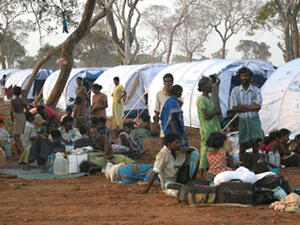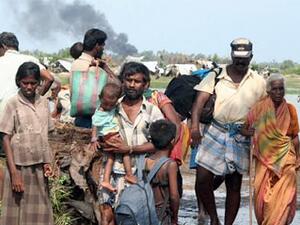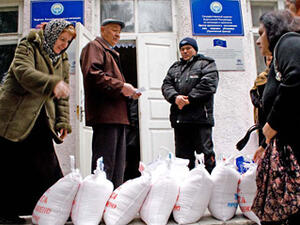Refugee guests join some of their hosts in leaving strife-ridden Central African Republic
Refugee guests join some of their hosts in leaving strife-ridden Central African Republic

The refugees returning from CAR are among the last of the thousands of Chadians who fled two decades ago, and were housed in Boubou camp, seen here in the late 1980s.
BEKONINGA, Chad, September 20 (UNHCR) - The first of more than 1,500 Chadian refugees who have spent the past two decades in exile in the Central African Republic were heading home in a repatriation operation that is due to be completed by early October, the UN refugee agency announced on Tuesday.
The UNHCR convoy carrying 321 Chadian returnees was due to reach the town of Goré, in southern Chad, on Tuesday evening. They are part of a group of 1,542 Chadians who have been refugees in the Central African Republic (CAR) since the early 1980s, after fleeing civil war in their home country. Continuing insecurity in the northern part of CAR has finally prompted them to go home. Thousands of the Central African Republic's own citizens have also fled the region in recent months seeking refuge in neighbouring Chad.
The first convoy, which left Boubou camp, 260 km north of the CAR capital Bangui on Monday, was due to finally cross the border into Chad at around 18:00 local time the following day.
The returnees, who are being accompanied by UNHCR staff throughout the journey, spent the first night at a transit centre set up in a school in the CAR town of Bossangoa. Médecins Sans Frontières (Spain), which gave the group a medical screening prior to their departure, also provided a nurse to travel with them on the convoy. A second nurse was supplied by CAR's Commission Nationale pour les Réfugiés (CNR).
After a delayed start due to heavy rain, the eight-truck convoy was reported to have set off again around midday on Tuesday, travelling along a main road through northern CAR to the border under the protection of a CAR military escort. The returnees will cross into Chad at the village of Békoninga, where they will be met by UNHCR Chad staff , Chadian government officials and representatives of CNAR (Commission Nationale d'Accueil et de Réinsertion des Réfugiés).
Chadian gendarmes will escort the convoy on the final leg of its journey to a transit centre in Amboko refugee camp, near the town of Goré, where they will be given food and spend the night. Non-food items such as cooking sets, blankets and mats will also be distributed to them during their stay in Amboko. UNHCR staff were expecting them to reach the camp around 20:00 local time on Tuesday evening.
The first returnees are all from the areas of Goré, Moundou and Koumra - the three main towns in southern Chad, according to UNHCR spokesman Ron Redmond. UNHCR is planning to take the returnees on to their home villages in those three areas on Wednesday or Thursday.
"Three or four additional convoys will follow over the next few weeks, and the repatriation movement should be completed by the beginning of October," Redmond said. "Some of the refugees yet to be repatriated are originally from N'Djamena and will have to be transported to the capital," he added.
In recent weeks, UNHCR has tripled its staff in Goré as it simultaneously made preparations for the repatriation operation, while also responding to new influxes of CAR refugees who have been crossing into southern Chad since June - also driven out by the insecurity affecting the northern part of their country. They have been lodged in the same Amboko camp.
Between 1999 and 2001, UNHCR helped repatriate thousands of Chadian refugees. Those going back now had decided not to take part in that earlier repatriation operation and to remain in CAR, where they were well-established and had become self-sufficient, in particular through the cultivation of cotton.
However, with insecurity growing in northern CAR since the end of 2004, this last group of Chadian refugees changed their minds and approached UNHCR to organize their return home. Many of the CAR refugees who have been arriving in Chad in recent months have reported attacks by bandits who stole their cattle and prevented them from working in their fields. Some of the returnees also said they no longer felt safe going out to work in the cotton plantations.
Altogether, there are still some 14,000 refugees in camps and urban areas in the Central African Republic. They come primarily from the Democratic Republic of the Congo, Sudan, Uganda, Congo Brazzaville, Rwanda, Burundi, and Sierra Leone. UNHCR is currently conducting a new registration of some of those groups in preparation for further possible repatriations in the coming months.
Aside from the returnees, there are an estimated 40,000 to 45,000 refugees from the Central African Republic itself now living in southern Chad - at least 10,000 of whom have fled the violence in northern CAR since June. In an entirely separate situation, a further 200,000 refugees from Sudan's Darfur region are living in camps in the hostile desert region of eastern Chad.
"UNHCR's concern is to see peace return in countries at war, in order to allow refugees suffering from these conflicts to return home and be safe," said UNHCR representative in Chad, Ana Liria-Franch. "Our wish is now to see peace in Darfur, as well as in the northern part of the Central African Republic. Then Sudanese and CAR refugees will also be able to return to their country just like the Chadians are doing today."









